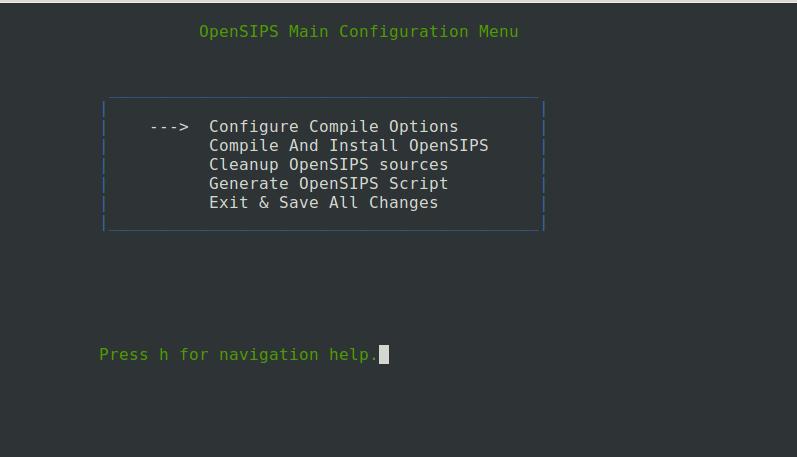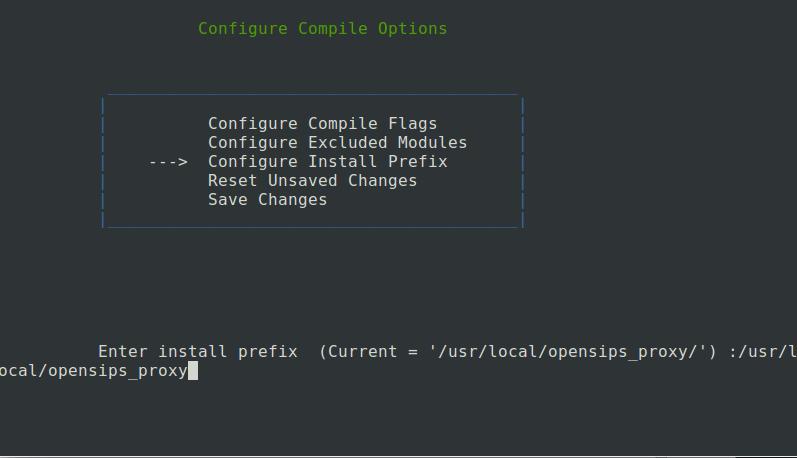1.opensips安装
opensips需要编译源码安装
官网:http://opensips.org
我下载的是:opensips-2.1.2_src.tar.gz
tar xcf opensips-2.1.2_src.tar.gz
cd opensips-2.1.2-tls/
sudo make menuconfig
在menuconfig中选择—>Configure Compile Options—> Configure Excluded Modules
方向键向下滚动,按空格选中[*] db_mysql

按q键返回上一级,选择—> Configure Install Prefix,输入/usr/local/opensips_proxy后按回车表示安装在/usr/local/opensips_proxy目录下。

选择 —> Save Changes 保存修改。
按q返回,选择 —> Compile And Install OpenSIPS,回车安装。
安装完成后会将配置文件放在/usr/local/opensips_proxy/etc/opensips目录下。运行文件在/usr/local/opensips_proxy/sbin目录下。
如果出现依赖错误,先通过apt-get安装依赖。
源代码安装软件要注意查看README,INSTALL等文件,这些文件里有很重要的说明和安装信息,里面有安装Opensips所需要的依赖包。
opensips安装之后的文件目录:
/sbin/中的可执行命令有如下:opensips 、opensipsctl 、 opensipsdbctl 、 opensipsunix
/etc/opensips/中的配置文件有:opensips.cfg、opensipsctlrc和osipsconsolerc
/lib/opensips/中的库文件有:modules和 opensipsctl两个目录。modules为当前opensips所支持的模块
2.opensips配置
opensips的配置文件都在/etc/opensips/中,分别为opensips.cfg、opensipsctlrc和osipsconsolerc。
opensips.cfg文件主要用于opensips启动的配置,所有应用功能的配置都在这个文件中说明。该配置文件主要由三个部分组成:
第一部分是全局变量,如:
listen=udp:127.0.0.1:5060
disable_tcp=yes
disable_tls=yes等。
第二部分主要用来加载模块,并设置相应参数,如:
loadmodule “db_mysql.so”
loadmodule “auth.so”
loadmodule “auth_db.so”
modparam(“auth”, “calculate_ha1”, yes)
modparam(“auth_db”, “password_column”, “password”)等。
第三部分主要是路由策略和功能应用,如:
route[relay] {
# for INVITEs enable some additional helper routes
if (is_method(“INVITE”)) {
t_on_branch(“per_branch_ops”);
t_on_reply(“handle_nat”);
t_on_failure(“missed_call”);
}
opensipsctlrc文件中包含了数据库配置的信息。
(1)
进入/usr/local/opensips_proxy/etc/opensips目录,运行osipsconfig命令
cd /usr/local/opensips_proxy/etc/opensips
sudo ./osipsconfig
依次选择—> Generate OpenSIPS Script —> Residential Script —> Configure Residential Script
选中如下几项
[*] ENABLE_TCP
[*] USE_ALIASES
[*] USE_AUTH
[*] USE_DBACC
[*] USE_DBUSRLOC
[*] USE_DIALOG
[*] USE_NAT
按q返回,选择 —> Generate Residential Script 回车,生成新的配置文件。按q(三次)退出命令
将新生成的opensips_residential_*.cfg文件重命名为opensips.cfg编辑
sudo mv opensips_residential_2016-3-7_16:19:22.cfg opensips.cfg
sudo vi opensips.cfg
总共改动了3处:
#
# $Id$
#
# OpenSIPS residential configuration script
# by OpenSIPS Solutions <team@opensips-solutions.com>
#
# This script was generated via "make menuconfig", from
# the "Residential" scenario.
# You can enable / disable more features / functionalities by
# re-generating the scenario with different options.#
#
# Please refer to the Core CookBook at:
# http://www.opensips.org/Resources/DocsCookbooks
# for a explanation of possible statements, functions and parameters.
#
####### Global Parameters #########
debug=3
log_stderror=no
log_facility=LOG_LOCAL0
fork=yes
children=4
/* uncomment the following lines to enable debugging */
#debug=6
#fork=no
#log_stderror=yes
/* uncomment the next line to enable the auto temporary blacklisting of
not available destinations (default disabled) */
#disable_dns_blacklist=no
/* uncomment the next line to enable IPv6 lookup after IPv4 dns
lookup failures (default disabled) */
#dns_try_ipv6=yes
/* comment the next line to enable the auto discovery of local aliases
based on revers DNS on IPs */
auto_aliases=no
#改动第1处
#注意:xxx.xxx.xxx.xxx.xxx是你自己的IP地址,不可以写为127.0.0.1
listen=udp:xxx.xxx.xxx.xxx:5060 # CUSTOMIZE ME
listen=tcp:xxx.xxx.xxx.xxx:5060 # CUSTOMIZE ME
####### Modules Section ########
#set module path
mpath="/usr/local/opensips_proxy//lib64/opensips/modules/"
#### SIGNALING module
loadmodule "signaling.so"
#### StateLess module
loadmodule "sl.so"
#### Transaction Module
loadmodule "tm.so"
modparam("tm", "fr_timeout", 5)
modparam("tm", "fr_inv_timeout", 30)
modparam("tm", "restart_fr_on_each_reply", 0)
modparam("tm", "onreply_avp_mode", 1)
#### Record Route Module
loadmodule "rr.so"
/* do not append from tag to the RR (no need for this script) */
modparam("rr", "append_fromtag", 0)
#### MAX ForWarD module
loadmodule "maxfwd.so"
#### SIP MSG OPerationS module
loadmodule "sipmsgops.so"
#### FIFO Management Interface
loadmodule "mi_fifo.so"
modparam("mi_fifo", "fifo_name", "/tmp/opensips_fifo")
modparam("mi_fifo", "fifo_mode", 0666)
#### URI module
loadmodule "uri.so"
modparam("uri", "use_uri_table", 0)
modparam("uri", "db_url",
"mysql://opensips:opensipsrw@localhost/opensips") # CUSTOMIZE ME
#### MYSQL module
loadmodule "db_mysql.so"
#### USeR LOCation module
loadmodule "usrloc.so"
modparam("usrloc", "nat_bflag", "NAT")
modparam("usrloc", "db_mode", 2)
modparam("usrloc", "db_url",
"mysql://opensips:opensipsrw@localhost/opensips") # CUSTOMIZE ME
#### REGISTRAR module
loadmodule "registrar.so"
modparam("registrar", "tcp_persistent_flag", "TCP_PERSISTENT")
modparam("registrar", "received_avp", "$avp(received_nh)")
/* uncomment the next line not to allow more than 10 contacts per AOR */
#modparam("registrar", "max_contacts", 10)
#### ACCounting module
loadmodule "acc.so"
/* what special events should be accounted ? */
modparam("acc", "early_media", 0)
modparam("acc", "report_cancels", 0)
/* by default we do not adjust the direct of the sequential requests.
if you enable this parameter, be sure the enable "append_fromtag"
in "rr" module */
modparam("acc", "detect_direction", 0)
modparam("acc", "failed_transaction_flag", "ACC_FAILED")
/* account triggers (flags) */
modparam("acc", "db_flag", "ACC_DO")
modparam("acc", "db_missed_flag", "ACC_MISSED")
modparam("acc", "db_url",
"mysql://opensips:opensipsrw@localhost/opensips") # CUSTOMIZE ME
#### AUTHentication modules
loadmodule "auth.so"
loadmodule "auth_db.so"
modparam("auth_db", "calculate_ha1", yes)
modparam("auth_db", "password_column", "password")
modparam("auth_db|uri", "db_url",
"mysql://opensips:opensipsrw@localhost/opensips") # CUSTOMIZE ME
modparam("auth_db", "load_credentials", "")
#### ALIAS module
loadmodule "alias_db.so"
modparam("alias_db", "db_url",
"mysql://opensips:opensipsrw@localhost/opensips") # CUSTOMIZE ME
#### DIALOG module
loadmodule "dialog.so"
modparam("dialog", "dlg_match_mode", 1)
modparam("dialog", "default_timeout", 21600) # 6 hours timeout
modparam("dialog", "db_mode", 2)
modparam("dialog", "db_url",
"mysql://opensips:opensipsrw@localhost/opensips") # CUSTOMIZE ME
#### NAT modules
loadmodule "nathelper.so"
modparam("nathelper", "natping_interval", 10)
modparam("nathelper", "ping_nated_only", 1)
modparam("nathelper", "sipping_bflag", "SIP_PING_FLAG")
modparam("nathelper", "sipping_from", "sip:pinger@127.0.0.1") #CUSTOMIZE ME
modparam("nathelper", "received_avp", "$avp(received_nh)")
#改动第2处
#端口号22222可以随便修改,但是必须和后面安装的rtpproxy的端口号相同
loadmodule "rtpproxy.so"
modparam("rtpproxy", "rtpproxy_sock", "udp:localhost:22222") # CUSTOMIZE ME
#改动第3处
#增加MediaProxy模块
#增加下边这一段
#### MediaProxy module
loadmodule "mediaproxy.so"
modparam("mediaproxy", "disable", 0)
modparam("mediaproxy", "mediaproxy_socket", "/var/run/mediaproxy/dispatcher.sock")
modparam("mediaproxy", "mediaproxy_timeout", 1000)
modparam("mediaproxy", "signaling_ip_avp", "$avp(nat_ip)")
modparam("mediaproxy", "media_relay_avp", "$avp(media_relay)")
modparam("mediaproxy", "ice_candidate", "low-priority")
loadmodule "proto_udp.so"
loadmodule "proto_tcp.so"
####### Routing Logic ########
# main request routing logic
route{
force_rport();
if (nat_uac_test("23")) {
if (is_method("REGISTER")) {
fix_nated_register();
setbflag(NAT);
} else {
fix_nated_contact();
setflag(NAT);
}
}
if (!mf_process_maxfwd_header("10")) {
sl_send_reply("483","Too Many Hops");
exit;
}
if (has_totag()) {
# sequential request withing a dialog should
# take the path determined by record-routing
if (loose_route()) {
# validate the sequential request against dialog
if ( $DLG_status!=NULL && !validate_dialog() ) {
xlog("In-Dialog $rm from $si (callid=$ci) is not valid according to dialog\n");
## exit;
}
if (is_method("BYE")) {
setflag(ACC_DO); # do accounting ...
setflag(ACC_FAILED); # ... even if the transaction fails
} else if (is_method("INVITE")) {
# even if in most of the cases is useless, do RR for
# re-INVITEs alos, as some buggy clients do change route set
# during the dialog.
record_route();
}
if (check_route_param("nat=yes"))
setflag(NAT);
# route it out to whatever destination was set by loose_route()
# in $du (destination URI).
route(relay);
} else {
if ( is_method("ACK") ) {
if ( t_check_trans() ) {
# non loose-route, but stateful ACK; must be an ACK after
# a 487 or e.g. 404 from upstream server
t_relay();
exit;
} else {
# ACK without matching transaction ->
# ignore and discard
exit;
}
}
sl_send_reply("404","Not here");
}
exit;
}
# CANCEL processing
if (is_method("CANCEL"))
{
if (t_check_trans())
t_relay();
exit;
}
t_check_trans();
if ( !(is_method("REGISTER") ) ) {
if (from_uri==myself)
{
# authenticate if from local subscriber
# authenticate all initial non-REGISTER request that pretend to be
# generated by local subscriber (domain from FROM URI is local)
if (!proxy_authorize("", "subscriber")) {
proxy_challenge("", "0");
exit;
}
if (!db_check_from()) {
sl_send_reply("403","Forbidden auth ID");
exit;
}
consume_credentials();
# caller authenticated
} else {
# if caller is not local, then called number must be local
if (!uri==myself) {
send_reply("403","Rely forbidden");
exit;
}
}
}
# preloaded route checking
if (loose_route()) {
xlog("L_ERR",
"Attempt to route with preloaded Route's [$fu/$tu/$ru/$ci]");
if (!is_method("ACK"))
sl_send_reply("403","Preload Route denied");
exit;
}
# record routing
if (!is_method("REGISTER|MESSAGE"))
record_route();
# account only INVITEs
if (is_method("INVITE")) {
# create dialog with timeout
if ( !create_dialog("B") ) {
send_reply("500","Internal Server Error");
exit;
}
setflag(ACC_DO); # do accounting
}
if (!uri==myself) {
append_hf("P-hint: outbound\r\n");
route(relay);
}
# requests for my domain
if (is_method("PUBLISH|SUBSCRIBE"))
{
sl_send_reply("503", "Service Unavailable");
exit;
}
if (is_method("REGISTER"))
{
# authenticate the REGISTER requests
if (!www_authorize("", "subscriber"))
{
www_challenge("", "0");
exit;
}
if (!db_check_to())
{
sl_send_reply("403","Forbidden auth ID");
exit;
}
if ( proto==TCP || 0 ) setflag(TCP_PERSISTENT);
if (isflagset(NAT)) {
setbflag(SIP_PING_FLAG);
}
if (!save("location"))
sl_reply_error();
exit;
}
if ($rU==NULL) {
# request with no Username in RURI
sl_send_reply("484","Address Incomplete");
exit;
}
# apply DB based aliases
alias_db_lookup("dbaliases");
# do lookup with method filtering
if (!lookup("location","m")) {
if (!db_does_uri_exist()) {
send_reply("420","Bad Extension");
exit;
}
t_newtran();
t_reply("404", "Not Found");
exit;
}
if (isbflagset(NAT)) setflag(NAT);
# when routing via usrloc, log the missed calls also
setflag(ACC_MISSED);
route(relay);
}
route[relay] {
# for INVITEs enable some additional helper routes
if (is_method("INVITE")) {
if (isflagset(NAT)) {
rtpproxy_offer("ro");
}
t_on_branch("per_branch_ops");
t_on_reply("handle_nat");
t_on_failure("missed_call");
}
if (isflagset(NAT)) {
add_rr_param(";nat=yes");
}
if (!t_relay()) {
send_reply("500","Internal Error");
};
exit;
}
branch_route[per_branch_ops] {
xlog("new branch at $ru\n");
}
onreply_route[handle_nat] {
if (nat_uac_test("1"))
fix_nated_contact();
if ( isflagset(NAT) )
rtpproxy_answer("ro");
xlog("incoming reply\n");
}
failure_route[missed_call] {
if (t_was_cancelled()) {
exit;
}
# uncomment the following lines if you want to block client
# redirect based on 3xx replies.
##if (t_check_status("3[0-9][0-9]")) {
##t_reply("404","Not found");
## exit;
##}
}
local_route {
if (is_method("BYE") && $DLG_dir=="UPSTREAM") {
acc_db_request("200 Dialog Timeout", "acc");
}
}
(2)修改opensipsctlrc文件
cd /usr/local/opensips_proxy/etc/opensips
sudo vi opensipsctlrc
去掉所有DB相关的注释。
# $Id$
#
# The OpenSIPS configuration file for the control tools.
#
# Here you can set variables used in the opensipsctl and opensipsdbctl setup
# scripts. Per default all variables here are commented out, the control tools
# will use their internal default values.
## your SIP domain
SIP_DOMAIN=xxx.xxx.xxx.xxx #你自己的IP地址
## chrooted directory
# $CHROOT_DIR="/path/to/chrooted/directory"
## database type: MYSQL, PGSQL, ORACLE, DB_BERKELEY, or DBTEXT,
## by default none is loaded
# If you want to setup a database with opensipsdbctl, you must at least specify
# this parameter.
DBENGINE=MYSQL
## database host
DBHOST=localhost
## database name (for ORACLE this is TNS name)
DBNAME=opensips
# database path used by dbtext or db_berkeley
# DB_PATH="/usr/local/etc/opensips/dbtext"
## database read/write user
DBRWUSER=opensips
## password for database read/write user
DBRWPW="opensipsrw"
## database super user (for ORACLE this is 'scheme-creator' user)
DBROOTUSER="root"
# user name column
# USERCOL="username"
为opensips新建数据库,增加域名及用户:
cd /usr/local/opensips_proxy/sbin/
sudo ./opensipsdbctl create
sudo ./opensipsctl domain add xdty.org #如果没有域名可不用添加
sudo ./opensipsctl add 10000 123456
sudo ./opensipsctl add 10001 123456
3.安装rtpproxy并配置
sudo apt-get install rtpproxy
sudo vi /etc/default/rtpproxy
修改为如下内容
# Defaults for rtpproxy
# The control socket.
#CONTROL_SOCK="unix:/var/run/rtpproxy/rtpproxy.sock"
# To listen on an UDP socket, uncomment this line:
CONTROL_SOCK=udp:127.0.0.1:22222
# Additional options that are passed to the daemon.
EXTRA_OPTS=""
LISTEN_ADDR=xxx.xxx.xxx.xxx #你自己的IP地址
EXTRA_OPTS="-l ${LISTEN_ADDR}"
启动rtpproxy
sudo killall rtpproxy
sudo /etc/init.d/rtpproxy start
注意:如果rtpproxy启动失败,请检查/etc/init.d/rtpproxy脚本DAEMON路径是否正确,默认为DAEMON=/usr/sbin/$NAME,可能要改为DAEMON=/usr/bin/$NAME
4.安装并配置mediaproxy
导入源密钥,增加mediaproxy的源到/etc/apt/sources.list
wget http://download.ag-projects.com/agp-debian-gpg.key
sudo apt-key add agp-debian-gpg.key
sudo vi /etc/apt/sources.list
最后位置添加
deb http://ag-projects.com/ubuntu precise main
deb-src http://ag-projects.com/ubuntu precise main
安装mediaproxy
sudo apt-get update
sudo apt-get install mediaproxy-dispatcher mediaproxy-relay mediaproxy-web-sessions
因media-relay需要内核支持ipv4 forwarding,所以需要执行(以root用户执行):
sudo su
echo 1 > /proc/sys/net/ipv4/ip_forward
注意:可以vi /proc/sys/net/ipv4/ip_forward查看里面是否为1,有时候还是为0,如果此时为0,继续执行一遍echo 1 > /proc/sys/net/ipv4/ip_forward,直到里面的内容为1
在文件/etc/sysctl.config中打开net.ipv4.ip_forward=1 这样即便重启设备也可以运行mediaproxy了。
另外,media的dispatcher和relay之间需要通过tls通信,故需要在/etc/mediaproxy/tls/中有认证文件,进入/etc/mediaproxy/tls目录,拷本密钥文件,修改配置文件
cd /etc/mediaproxy/tls/
sudo cp /usr/share/doc/mediaproxy-common/tls/* .
cd ..
sudo vi config.ini
修改为类似如下内容
[Relay]
dispatchers = xxx.xxx.xxx.xxx #你自己的地址
passport = None
relay_ip = xxx.xxxx.xxx.xxx #你自己的IP地址
port_range = 50000:60000
log_level = DEBUG
stream_timeout = 90
on_hold_timeout = 7200
reconnect_delay = 10
traffic_sampling_period = 15
[Dispatcher]
socket_path = dispatcher.sock
listen = xxx.xxx.xxx.xxx
listen_management = xxx.xxx.xxx.xxx #你自己的IP地址
management_use_tls = yes
passport = None
management_passport = None
log_level = DEBUG
relay_timeout = 5
[TLS]
certs_path = tls
verify_interval = 300
[Database]
[Radius]
[OpenSIPS]
socket_path = /var/run/opensips/socket
max_connections = 10
启动mediaproxy服务
sudo media-dispatcher restart
sudo media-relay restart
或者:
sudo service mediaproxy-dispatcher restart
sudo service mediaproxy-relay restart
查看mediaproxy是否正常运行:
ps -ef | grep media
如果出现:
root 6592 2110 0 14:25 ?00:00:01 /usr/bin/python /usr/bin/media-dispatcher restart
root 6969 2110 0 14:35 ?00:00:04 /usr/bin/python /usr/bin/media-relay restart
则说明已经正常启动。如果没有正常启动可以在/var/log/syslog中查看原因
5.启动服务并检验
修改日志文件配置,是opensips的日志保存在/var/log/opensips.log
sudo touch /var/log/opensips.log
sudo chmod 777 /var/log/opensips.log
sudo vi /etc/rsyslog.d/opensips.conf
增加如下内容
local0.* /var/log/opensips.log
重启syslog服务,启动opensips
sudo service rsyslog restart
sudo /usr/local/opensips_proxy/sbin/opensipsctl start
如果启动失败,查看/var/log/opensips.log文件查找错误.
服务启动后,防火墙开启tcp及udp的端口
iptables -I INPUT -p tcp –dport 5060 -j ACCEPT
iptables -I INPUT -p udp –dport 5060 -j ACCEPT
iptables-save
好了,现在可以用SIP客户端登录上面创建的帐号,测试了。

